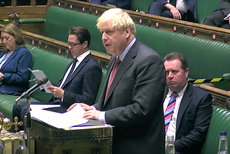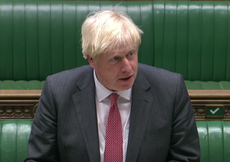Coronavirus: New restrictions could last for six months, Boris Johnson says
Measures to come into effect in England over the next six days
Your support helps us to tell the story
From reproductive rights to climate change to Big Tech, The Independent is on the ground when the story is developing. Whether it's investigating the financials of Elon Musk's pro-Trump PAC or producing our latest documentary, 'The A Word', which shines a light on the American women fighting for reproductive rights, we know how important it is to parse out the facts from the messaging.
At such a critical moment in US history, we need reporters on the ground. Your donation allows us to keep sending journalists to speak to both sides of the story.
The Independent is trusted by Americans across the entire political spectrum. And unlike many other quality news outlets, we choose not to lock Americans out of our reporting and analysis with paywalls. We believe quality journalism should be available to everyone, paid for by those who can afford it.
Your support makes all the difference.Boris Johnson has set the scene for another six months of restrictions to social and economic life across the UK, as he warned that the battle against a second wave of coronavirus could drag on beyond Christmas and into the spring.
Announcing a curfew on pubs and restaurants and new guidance for office workers to stay home if possible, the prime minister warned that he might be forced to “deploy greater firepower” if these steps do not succeed in reducing the R rate of transmission below the crucial level of one, above which Covid-19 can spread exponentially.
But Nicola Sturgeon went further immediately, banning visits between households north of the border, after Scotland’s chief medical officer warned her cabinet that the measures proposed by Mr Johnson “would not be sufficient to bring the R number down”.
Business reacted with dismay, with the CBI warning of a “crushing blow” to thousands of firms, particularly in the hospitality sector and inner-city services hit by the absence of commuters.
There were immediate calls for an extension of furlough and other financial support for businesses, as well as demands for the PM to “turbo-charge” his under-performing test and trace system, which was widely blamed for allowing a surge in Covid cases.
Bank of England governor Andrew Bailey suggested chancellor Rishi Sunak should "stop and rethink" his plans to halt his job retention scheme at the end of October and consider targeting further support to the worst-hit sectors of the economy.
New figures showed infections reaching 4,926 a day in the UK – their highest since 7 May – with deaths reaching a six-week high of 37 and expected to rise further as daily hospitalisations doubled over the last fortnight.
In a sombre statement to the House of Commons, later followed by a TV address to the nation, Mr Johnson said Britain stood at a “perilous turning point”, and must act now to avoid “still graver consequences” later.
Speaking on Tuesday evening, he said there would be “unquestionably difficult months to come” and also appeared to pin blame on a rise in infections on members of the public breaching the rules.
“We have to acknowledge this is a great and freedom-loving country; and while the vast majority have complied with the rules there have been too many breaches – too many opportunities for our invisible enemy to slip through undetected,” he said.
The PM added a new national lockdown would threaten jobs and livelihoods across the UK, but warned: “If people don’t follow the rules we have set out, then we must reserve the right to go further.”
He said: “Never in our history has our collective destiny and our collective health depended so completely on our individual behaviour. If we follow these simple rules together, we will get through this winter together."
In new measures covering the whole of England, he announced:
- A 10pm-5am curfew and mandatory table service for all pubs, cafes and restaurants, to come into effect on Thursday and include takeaways, though late-night food deliveries will continue to be permitted.
- Mandatory face coverings for taxi passengers from Wednesday and for shop assistants and hospitality staff from Thursday. Customers in pubs and restaurants will be obliged to cover their faces except when seated to eat and drink.
- A reduction from 30 to 15 in the maximum attendance at weddings and receptions, coming into effect on Monday, so ceremonies this weekend can go ahead as planned.
- A ban from Thursday on indoor sports involving more than six players.
In an abrupt turnaround from his previous “back to work” message, office staff were told to work from home if possible.
New laws will require hospitality and retail businesses to ensure the customers comply with restrictions and fines for breaching the “rule of six” limit on social gatherings or failing to wear a mask will be doubled from £100 to £200.
And plans to reopen large sporting events to fans from 1 October were ditched.
CBI director general Dame Carolyn Fairbairn said there was “no avoiding the crushing blow the new measures bring for thousands of firms”, while Federation of Small Businesses chair Mike Cherry said many companies were now “seriously fearing for their futures”.
Mr Cherry said it was now “paramount” that the government brings forward an “ambitious” second round of financial support to help firms survive. And Dame Carolyn said an extension to furlough and deferring VAT payments from the last quarter were now “a no-brainer” for the chancellor.
She added: “Testing is currently our single biggest weapon against the virus. It’s time for a united national push to turbo-charge testing capabilities.”
Scientists were sceptical about the impact of the 10pm curfew in reducing spread of Covid.
Exeter University’s Dr David Strain said: “Closing down restaurants and pubs earlier will do little to stave the spread for as long as multiple different households can interchangeably meet up.”
And Southampton University’s senior research fellow in global health Dr Michael Head said: “The urging of people to work from home if at all possible is sensible. There should never have been encouragement of people to return to their workplace.”
In a gloomy message which threatened to dash business and family hopes of a normal Christmas, the prime minister said: “Unless we palpably make progress then we should assume that the restrictions I have announced will remain in place for perhaps six months.”
The six-month timescale, beginning on Wednesday, would mean the UK remaining under restrictions of one sort or another for exactly a year from the 23 March imposition of the first lockdown.
Mr Johnson consulted with the first ministers of Scotland, Wales and Northern Ireland at a meeting of the government’s Cobra emergency committee, and said he expected that similar measures would be taken across the four nations of the UK.
But Ms Sturgeon made clear she is actively considering the much tougher option – proposed by chief medical officer Professor Chris Whitty but rejected by the PM – of a two-week “circuit break” shutdown across Scotland to coincide with schools’ October half-term.
Mr Johnson said the government will provide police and local authorities with the extra funds needed to ensure a greater police presence on our streets, with the option to call in troops to provide additional support.
His offer of military assistance got a cold welcome from the Police Federation, who said the prospect of troops on the streets enforcing Covid rules was “not needed and has not been asked for”. But aides said any military involvement would be purely logistical, taking on responsibilities such as guard duties at sensitive sites to free up police officers, as has been the case throughout the crisis.
Mr Johnson told MPs that new restrictions were “carefully judged to achieve the maximum reduction in the R number with the minimum damage to lives and livelihoods”.
He said: “I want to stress that this is by no means a return to the full lockdown of March. We’re not issuing a general instruction to stay at home. We will ensure that schools, colleges, universities stay open because nothing is more important than the education, health and well-being of our young people. We will ensure businesses can stay open in a Covid-compliant way. However we must take action to suppress the disease.”
Labour leader Sir Keir Starmer, who used his keynote speech to the party’s virtual conference earlier in the day to denounce the PM’s “serial incompetence” in the coronavirus crisis, said that he would support the measures set out by Mr Johnson.
But he said that families were worried that “the government doesn’t have a strategy”.
Mr Johnson rejected a call from Liberal Democrat leader Sir Ed Davey to apologise for “his gross incompetence on testing, on tracing, on clear communications that have led to these restrictions on people’s daily lives”.
The PM insisted he was “proud” of the performance of the NHS test and trace system, which he said was now conducting more tests than any other country in Europe.




Join our commenting forum
Join thought-provoking conversations, follow other Independent readers and see their replies
Comments